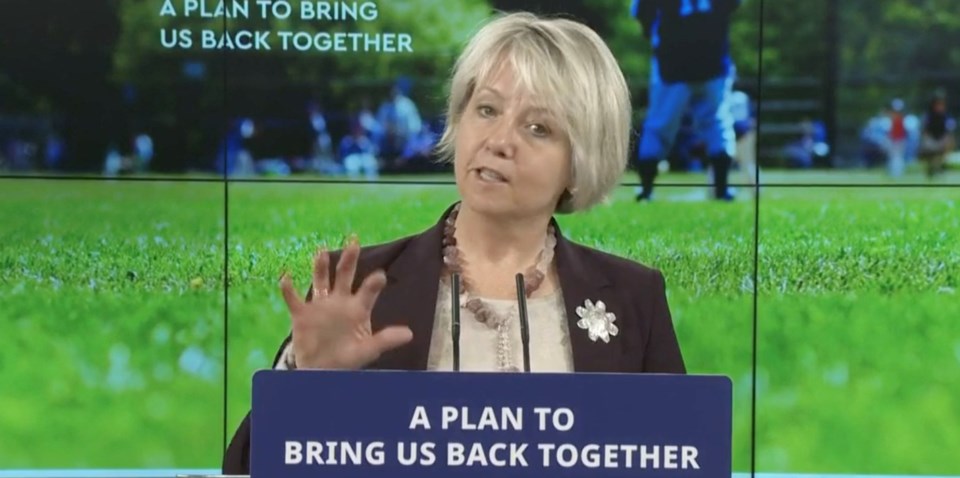B.C. health officials are closely monitoring for a rise in the spread of the COVID-19 variant dubbed Delta, but said on June 14 that they are not letting their concern about Delta's spread alter the province's reopening plan.
The news comes on a day when U.K. Prime Minister Boris Johnson announced that he would delay lifting lockdown restrictions in his country, to July 19, from what had been June 21. In the U.K., indoor gatherings are limited to six people, while outdoor gatherings are capped at 30 individuals. Restrictions are in effect for pubs, restaurants and other hospitality venues.
One of the ways that B.C. differs from the U.K. is that far more teenagers and young adults have had at least one dose of vaccine in B.C. than in the U.K., provincial health officer Bonnie Henry said June 14.
"A lot of transmission that they're seeing, right now in the U.K., is in people in their teens, and 20s and 30s," Henry said. "We have very high [vaccination] rates, even in young people."
Statistics that Henry provided last week show that about half of all British Columbians aged 12 through 19 had received at least one dose of vaccine as of June 9.
The Delta variant, which originated in India, is responsible for about 90% of new COVID-19 infections in the U.K., with Public Health England (PHE) data showing 42,323 cases of the Delta variant across the U.K., up 240% from a week ago.
The PHE has said that the variant is 64% more transmissible in homes, even after adjusting for a range of demographic factors, including age, sex, race, socioeconomic status, as well as vaccination status.
Henry stressed that the province is taking the Delta variant seriously.
British Columbia Centre for Disease Control (BCCDC) researchers in April stopped conducting full genome-sequencing analysis on each new COVID-19 infection because the work was overwhelming. Back then, B.C. was averaging more than 1,000 new infections per day.
Those researchers have since resumed conducting full genome sequencing on each confirmed COVID-19 case in B.C., so as to be certain about the spread of so-called variants of concern (VOC), she said.
Henry last week released a COVID-19 update that included a breakdown of variants of concern in B.C. up until May 30. Almost all new COVID-19 cases in B.C. are some kind of variant, she said. There are more than a dozen variants that health officials are not particularly concerned about, while four others are VOC.
The VOC are thought to either transmit more readily, cause more severe illness or have comparatively more resistance to vaccines.
The Delta variant only accounted for 4% of VOC on May 30, Henry said last week. In contrast, the Alpha variant, which was first discovered in the U.K., accounted for 54% of all new VOC in B.C. at the end of May. The Gamma variant, which was first discovered in Brazil, was responsible for 42% of new cases. Finally, the Beta variant, which was first discovered in South Africa, was responsible for less than 1% of new COVID-19 cases in B.C. at the end of May.
In the week that ended on May 30, B.C. had a daily average of slightly more than 282 new COVID-19 infections per day. The province's average daily case count has since fallen by about 43%, and was an average of slightly more than 161 new COVID-19 infections per day in the week that ended June 11.
Henry added that the same measures the province is taking to limit COVID-19's spread works to prevent infections in any of the variants.
The province's reopening plan progresses to Step 2 on June 15.
Among the loosened restrictions in Step 2 are that:
• British Columbians will be allowed to travel freely throughout B.C.;
• bars, pubs and restaurants can sell liquor up until midnight;
• indoor gatherings can range up to 50, meaning that cinemas can reopen, and banquet halls can operate; and
• spectators will be allowed to watch sporting events when gatherings are 50 people or fewer.
Masks must still be worn in condominium common areas, retail stores and other public venues. The province continues to advise against travel outside B.C., while nightclubs and casinos must still remain closed.
The next step of the province's reopening plan is slated for no earlier than July 1.



